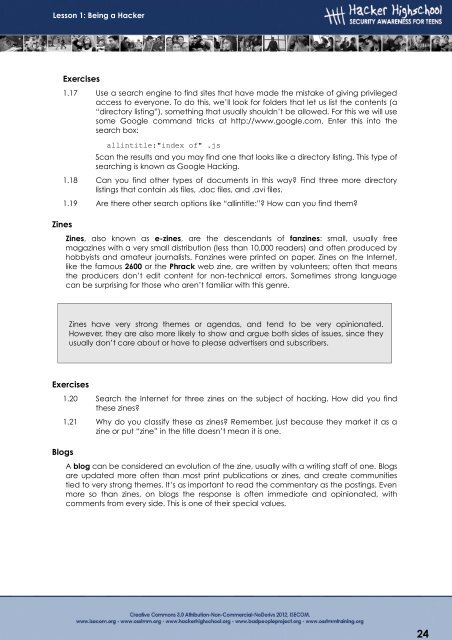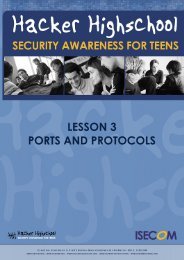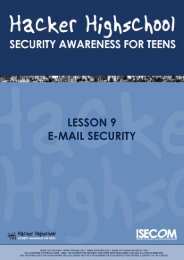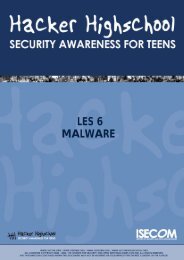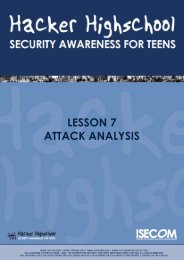Lesson 1: Being a Hacker - Hacker Highschool
Lesson 1: Being a Hacker - Hacker Highschool
Lesson 1: Being a Hacker - Hacker Highschool
You also want an ePaper? Increase the reach of your titles
YUMPU automatically turns print PDFs into web optimized ePapers that Google loves.
24<br />
<strong>Lesson</strong> 1: <strong>Being</strong> a <strong>Hacker</strong><br />
Exercises<br />
Zines<br />
1.17 Use a search engine to find sites that have made the mistake of giving privileged<br />
access to everyone. To do this, we’ll look for folders that let us list the contents (a<br />
“directory listing”), something that usually shouldn’t be allowed. For this we will use<br />
some Google command tricks at http://www.google.com. Enter this into the<br />
search box:<br />
allintitle:"index of" .js<br />
Scan the results and you may find one that looks like a directory listing. This type of<br />
searching is known as Google Hacking.<br />
1.18 Can you find other types of documents in this way? Find three more directory<br />
listings that contain .xls files, .doc files, and .avi files.<br />
1.19 Are there other search options like “allintitle:”? How can you find them?<br />
Zines, also known as e-zines, are the descendants of fanzines: small, usually free<br />
magazines with a very small distribution (less than 10,000 readers) and often produced by<br />
hobbyists and amateur journalists. Fanzines were printed on paper. Zines on the Internet,<br />
like the famous 2600 or the Phrack web zine, are written by volunteers; often that means<br />
the producers don’t edit content for non-technical errors. Sometimes strong language<br />
can be surprising for those who aren’t familiar with this genre.<br />
Zines have very strong themes or agendas, and tend to be very opinionated.<br />
However, they are also more likely to show and argue both sides of issues, since they<br />
usually don’t care about or have to please advertisers and subscribers.<br />
Exercises<br />
Blogs<br />
1.20 Search the Internet for three zines on the subject of hacking. How did you find<br />
these zines?<br />
1.21 Why do you classify these as zines? Remember, just because they market it as a<br />
zine or put “zine” in the title doesn’t mean it is one.<br />
A blog can be considered an evolution of the zine, usually with a writing staff of one. Blogs<br />
are updated more often than most print publications or zines, and create communities<br />
tied to very strong themes. It’s as important to read the commentary as the postings. Even<br />
more so than zines, on blogs the response is often immediate and opinionated, with<br />
comments from every side. This is one of their special values.


